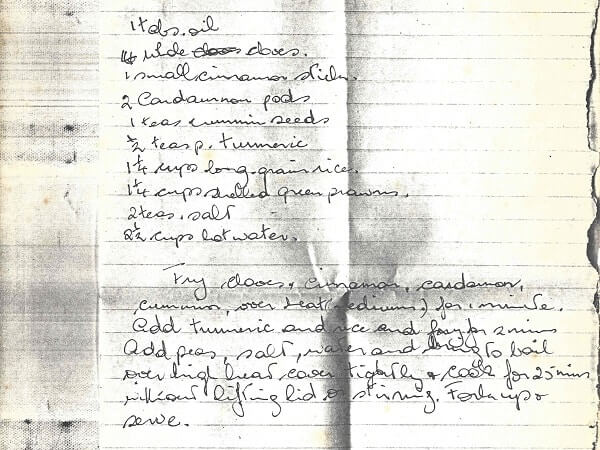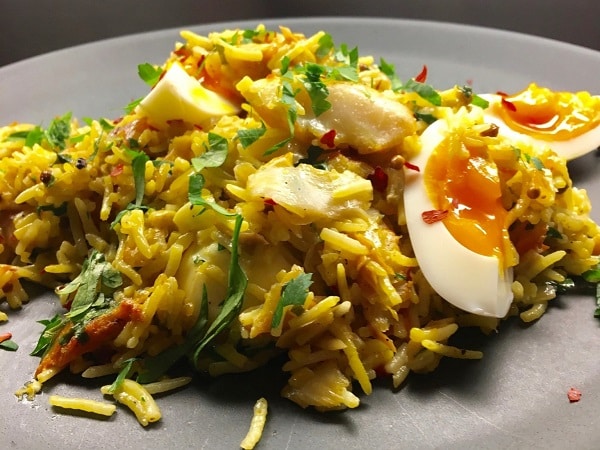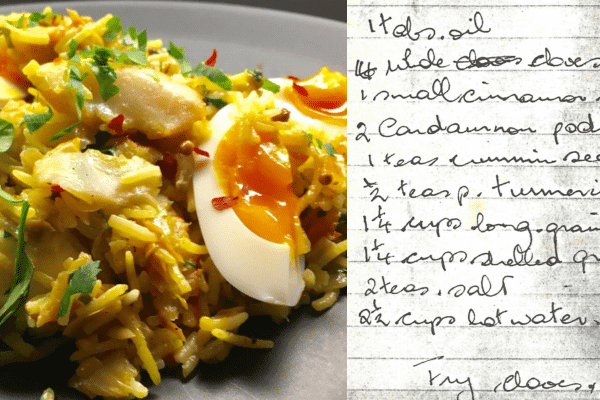Sydney resident Keith Pfeiffer has spent the last eight years documenting recipes of both traditional Indian and Anglo-Indian origin on his website. The Anglo-Indian foods are a fusion cuisine, which developed when the British ruled over India.
You might wonder what would an Australian sexagenarian know about these culinary influences in India? The answer lies in the riveting cookbook that Pfeiffer’s grandmother, Edith, has left behind and is now preserved as the family’s legacy.
Pfeiffer hails from a colonial British family – several generations lived in India until its Independence in 1947. His grandfather’s family went from Germany to India in the middle 1800s. His grandmother’s side of the family had been in India a little longer, arriving in the early 1880s from England.
“For the most part of their stay in India, they lived in Kolkata,” Pfeiffer tells Indian Link. “Given that my grandfather and his father worked for the British India Shipping Company, they did live for a time in other Indian port cities, notably Vasco Da Gama in Goa.”
Some members of the extended family were in the Army; a great-uncle, an engineer, was with the Indian Railways. At the time of the Independence, Pfeiffer’s part of the family moved back to England. Some others stayed.
Pfeiffer was born in London in the middle 1950s, when England was still recovering from the Second World War. “There was extensive unrepaired damage, rationing was a challenge, and it was a tough time. My father saw that migration to Australia may well provide opportunity that was not available in England then.” In 1960, they arrived in Melbourne. Pfeiffer studied mathematics and economics from the Melbourne University.
After marrying in 1985, Keith Pfeiffer and his wife moved to Sydney and eventually had two children. In his early 20s, Pfeiffer started collating the recipes his grandma Edith had left behind. The book is a treasure trove of recipes that Edith recorded during her stay in India.
Edith, the incredible
Edith was born in Pune in 1894. Her father was serving the Army during the British Raj. “She grew up in an affluent environment and took an interest in food in her teenage years, particularly the regional differences between different cooks. People would think of her as the ‘memsahib’. Her recipe notes state that what started as a hobby when she was young, became the rule book to inform cooks just how certain dishes were to be prepared,” Pfeiffer shares.
And these were not regular Indian dishes that Edith mentioned in her book. Many of them are quite different to what people may have experienced in Indian restaurants.

“There are several factors that make the recipes different – the first is that these recipes are based on shopping for the day’s requirements, the preparation, and then the stove-to-plate process. They are the opposite of what you may need to do in a restaurant, which is where most people in the western world have formed their Indian food experience. Restaurants need to offer choices in an economic manner. Home cooking doesn’t and can be labour intensive.”
Another difference is that some of these recipes are quite specific to regions that the cook came from and may not be familiar to some people. “An example is the Goan recipes – people are familiar with vindaloo (or think they are) but have yet to eat recheado flavoured foods,” he adds.
Many of these dishes were cooked by the domestic staff for the Colonial families. Therefore, they are tweaked for the English to be able to eat favourably. “One was the reduction of spices to cater for the western palette, and the other, far worse in my opinion, was the massive increase in spices, notably chilli as the British loved chilli. One major tweak, of course, is the introduction of non-traditional ingredients. A good example is produce like brussel sprouts, which are not native to India, but are quite capable of being cooked in an Indian way.”
Pfeiffer recalls the time when his father and his younger siblings would reflect upon growing up in Kolkata. His father loved the street food there. “To this day, when finding myself in Little India in Sydney’s west, it is the Bengali street food I find myself drawn to. For this I thank my father,” he smiles.
Pfeiffer’s aim is to eventually get this cookbook published. “A friend of my wife has a similar background to me – parents and family from colonial India, migrated to Australia – and we started to discuss the possibility of us accumulating our family recipes. We started to work with a publisher, but work intervened.”
The project died until one evening Pfeiffer, a passionate cook, invited guests over and served them beef curry with tamarind and ginger. “One of the guests, a freelance food stylist, suggested I post the recipes on the web and publish them at my own pace. And thats how the journey of my website started in 2015.”
Until his dream comes true, Keith Pfeiffer, now 66, is happy cooking from his grandma’s book twice a week! “Always vegetarian mid-week, something special for the weekend.”

What: Kedgeree. It is a cuisine originating from the British Raj in India and is served for breakfast. It is a spicy and buttery preparation of rice, fish and egg.
Calories: 712 kcal
Servings: 4 people
Total preparation time: 50 minutes
Ingredients:
· 300 g basmati rice
· 750 ml water
· ½ tsp salt
· 500 g smoked haddock fillets – boned
· 500 ml milk
· 2 Indian bay leaves
· 2 eggs – large, free-range
To cook:
75 g unsalted butter
· 2 tsp black mustard seeds
· 1 tsp cumin seeds
· 30 g ginger – finely chopped
· 4 green onions
· 1 clove garlic – finely chopped
· ½ tsp ground turmeric
· ½ tsp salt
· 1 red chilli – finely sliced
· 2 tomatoes – pulp removed and finely chopped
· 2 lemons – juiced
To serve:
· 1 cup coriander leaves – chopped
Instructions:
For the rice
· Rinse the rice thoroughly with several changes of water to remove any excess starch. Cover the rice with plenty of water and allow to soak for 30 minutes.
· Drain the water and put the soaked rice into a heavy pot. Add the water and salt. Bring to a boil over medium-high heat, uncovered. When it starts boiling, cover and reduce the heat to very low.
· After fifteen minutes, turn the heat off, fluff the rice with a fork and cover the pan with a tea-towel. Set aside and allow to stand for 5 minutes. Keith Pfeiffer
For the fish
· Put the fish in a small pan. Add the bay leaves then pour over the milk. Heat to simmering point, then reduce the heat and poach for about seven minutes, or until the flesh flakes easily.
· Use a slotted spoon to carefully remove the fish from the milk, place on absorbent paper and set aside. Keith Pfeiffer
For the eggs
· Prick the large end of the eggs with a pin. Place in a small pan and cover with cold water. Bring the water to a boil.
· When water starts to boil, reduce heat to a low simmer. Cook the eggs for six minutes, then immediately remove from the heat, drain, then cover eggs with cold water. You may need several changes of cold water to cool the eggs.
· Once cooled, carefully peel the eggs and set aside.
To cook
· Finely slice the white part of the spring onions and set aside. Coarsely slice the green part of the onions on the diagonal until you have a cupful, then set aside for a garnish.
· Melt the butter in a pan over low heat and add the mustard and cumin seeds.
· Once the seeds start to pop, add the ginger, the white parts of the onions and the garlic. Increase the heat to medium and cook for about five minutes to soften the onions.
· When onions have softened, but not coloured, add the turmeric, salt and chilli. Cook for a further two minutes, then add the chopped tomatoes and lemon juice. Stir well and cook for another two minutes to allow the tomato to soften.
· Stir in the cooked rice and heat through. Add the flaked fish and continue to stir, but gently enough to avoid breaking up the fish. When the rice and fish are hot, remove from the heat and add the fresh coriander. Mix well, but gently.
To serve Keith Pfeiffer
· Slice the eggs into quarters and place on top of the rice. Garnish with the sliced green onion and coriander leaves and serve.
Read More: Indian food has grown in Australia: Stephanie Alexander



